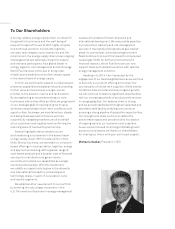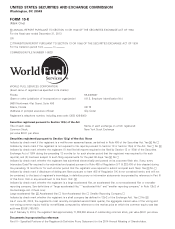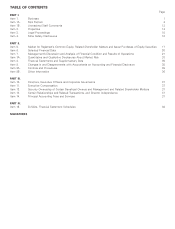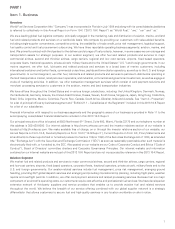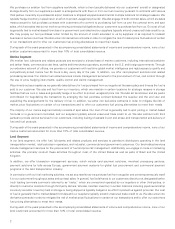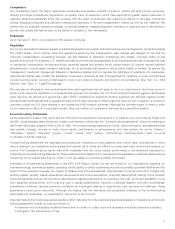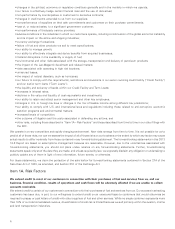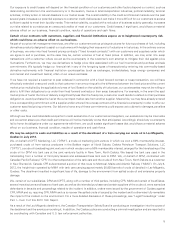World Fuel Services 2013 Annual Report Download - page 12
Download and view the complete annual report
Please find page 12 of the 2013 World Fuel Services annual report below. You can navigate through the pages in the report by either clicking on the pages listed below, or by using the keyword search tool below to find specific information within the annual report.Additional claims, lawsuits, proceedings, investigations and orders may be filed, commenced or issued with respect to the incident,
which may involve civil claims for damages or governmental investigative, regulatory or enforcement actions against us. The adverse
resolution of any proceedings related to these events could subject us and/or DPM or DPTS to monetary damages, fines and other
costs, which could have a negative and material impact on our business, prospects, results of operations and financial condition.
While we and our joint ventures, DPM and DPTS, maintain insurance to mitigate the costs of environmental releases as well as other
results of unexpected events, including loss of life, property damage and defense costs, there can be no guarantee that our insurance
will be adequate to cover all liabilities that may be incurred as a result of this incident. However, we expect that substantially all of the
legal costs we incur in defending against the proceedings described above will be covered by insurance.
We are also evaluating potential claims that we, DPM or DPTS may assert against third parties to recover costs and other liabilities that
may be incurred as a result of this incident. We can provide no guarantee that any such claims, if brought by us, will be successful or, if
successful, that the responsible parties will have the financial resources to address any such claims. Any losses not covered by
insurance or otherwise not recoverable from third parties, if significant, could have a material adverse effect on our business, financial
condition, results of operations or cash flows.
Our fuel storage and transportation operations have inherent risks that could negatively impact our stock price, results
of operations and financial condition.
Operating fuel storage and distribution terminals and transporting fuel products involve inherent risks including:
• oil spills and other environmental mishaps;
• fires, collisions and other catastrophic disasters;
• loss of life;
• severe damage to and destruction of property and equipment; and
• loss of product and business interruption.
Damage arising from such occurrences may result in fines and third party lawsuits asserting large claims. We maintain insurance to
mitigate these costs, but there can be no assurance that our insurance would be sufficient to cover the liabilities we might suffer from
the occurrence of one or more of the risks described above.
In addition, if we are involved in a spill, leak, fire or other accident involving hazardous substances or if there are releases of fuel or fuel
products we own or have custody of, our operations could be disrupted. We could also be subject to material liabilities, such as the
cost of investigating and remediating contaminated properties or claims by customers, employees or others who may have been
injured, or whose property may have been damaged. These liabilities, to the extent not covered by insurance, could have a material
adverse effect on our business, financial condition, results of operations and cash flows. Some environmental laws impose strict
liability, which means we could have liability without regard to whether we were negligent or at fault. Any of these occurrences, and
any resulting negative media coverage, could have a material adverse effect on our stock price and on our business, financial condition,
results of operations and cash flows.
Information technology failures and data security breaches could harm our business.
We rely upon our information technology (‘‘IT’’) and communications systems to support key business functions and the efficient
operation of these systems is critical to our business. Our IT systems, including our back-up systems, could be damaged or interrupted
by power outages, computer and telecommunications failures, viruses, security breaches, natural disasters, and/or errors by our
employees. A significant disruption in the functioning of these systems could damage our reputation, our ability to conduct our
business, impact our credit and risk exposure decisions, cause us to lose customers or revenues, subject us to litigation and/or require
us to incur significant expense to address and remediate or otherwise resolve these issues, which could have a material adverse effect
on our business, financial condition, results of operations and cash flows.
We also have access to sensitive, confidential or personal data or information in certain of our businesses, some of which may be
subject to privacy and security laws, regulations and customer-imposed controls. Despite our efforts to protect such information, our
facilities and systems and those of our third-party service providers may be vulnerable to security breaches, theft, misplaced or lost
data, programming and/or human errors that could potentially lead to the compromising of that information. We cannot be certain that
advances in criminal capabilities (including cyber-attacks or cyber intrusions over the Internet, malware, computer viruses and the like),
discovery of new vulnerabilities, physical system or network break-ins, inappropriate access, or other developments will not
compromise or breach the technology protecting our networks that access and store sensitive information. The risk of a security
breach or disruption, including by computer hackers, foreign governments and cyber terrorists, has increased as the number, intensity
and sophistication of attempted attacks and intrusions from around the world have increased. Furthermore, there has been
heightened legislative and regulatory focus on data security in the U.S. and abroad (particularly in the European Union). Significant
changes in applicable regulations may require us to make costly changes to our systems. Although we have taken steps to address
these concerns by implementing network security and internal control measures, there can be no assurance that a system failure or
data security breach will not have a material adverse effect on our business, financial condition, results of operations and cash flows.
6


